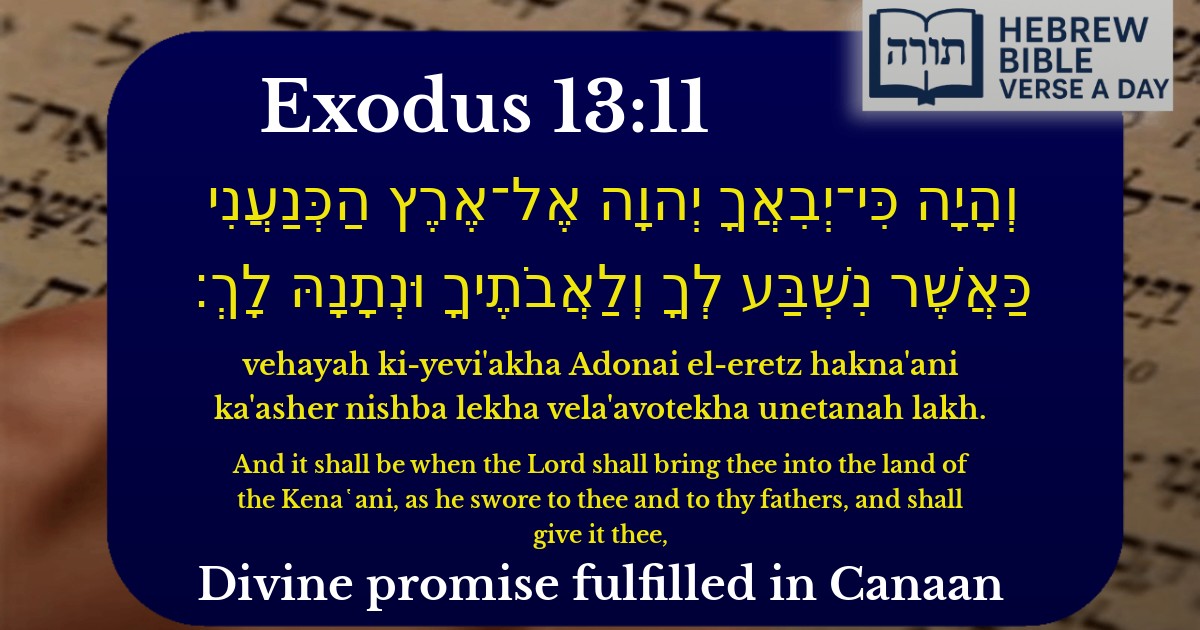Join Our Newsletter To Be Informed When New Videos Are Posted
Join the thousands of fellow Studends who rely on our videos to learn how to read the bible in Hebrew for free!
Hebrew Text
וְהָיָה כִּי־יְבִאֲךָ יְהוָה אֶל־אֶרֶץ הַכְּנַעֲנִי כַּאֲשֶׁר נִשְׁבַּע לְךָ וְלַאֲבֹתֶיךָ וּנְתָנָהּ לָךְ׃
English Translation
And it shall be when the Lord shall bring thee into the land of the Kena῾ani, as he swore to thee and to thy fathers, and shall give it thee,
Transliteration
Vehayah ki-yevi'akha Adonai el-eretz hakna'ani ka'asher nishba lekha vela'avotekha unetanah lakh.
Hebrew Leining Text
וְהָיָ֞ה כִּֽי־יְבִאֲךָ֤ יְהֹוָה֙ אֶל־אֶ֣רֶץ הַֽכְּנַעֲנִ֔י כַּאֲשֶׁ֛ר נִשְׁבַּ֥ע לְךָ֖ וְלַֽאֲבֹתֶ֑יךָ וּנְתָנָ֖הּ לָֽךְ׃
וְהָיָ֞ה כִּֽי־יְבִאֲךָ֤ יְהֹוָה֙ אֶל־אֶ֣רֶץ הַֽכְּנַעֲנִ֔י כַּאֲשֶׁ֛ר נִשְׁבַּ֥ע לְךָ֖ וְלַֽאֲבֹתֶ֑יךָ וּנְתָנָ֖הּ לָֽךְ׃
🎵 Listen to leining
Parasha Commentary
📚 Talmud Citations
This verse is quoted in the Talmud.
📖 Sotah 32b
The verse is referenced in the discussion about the recitation of the Shema and the exodus from Egypt, emphasizing God's promise to bring the Israelites into the land of Canaan.
📖 Kiddushin 37b
The verse is cited in the context of discussing the commandments that are obligatory only in the land of Israel, highlighting the fulfillment of God's promise to give the land to the Israelites.


Context in the Torah
This verse appears in Shemot (Exodus) 13:11, as part of the commandments regarding the consecration of firstborns and the future entry into Eretz Yisrael. The promise of the land is a central theme in the Torah, rooted in the covenant with Avraham, Yitzchak, and Yaakov.
Rashi's Commentary
Rashi explains that the phrase "כַּאֲשֶׁר נִשְׁבַּע לְךָ וְלַאֲבֹתֶיךָ" ("as He swore to you and to your fathers") emphasizes that the fulfillment of this oath is not dependent on the merit of Bnei Yisrael alone, but also on the merit of the Avot (forefathers). This underscores the eternal nature of the covenant.
Rambam's Perspective
In Hilchot Melachim, Rambam (Maimonides) discusses the obligation to settle Eretz Yisrael as a mitzvah. This verse serves as a foundational prooftext for the divine promise and commandment to inherit the land, which remains binding in all generations.
Midrashic Interpretation
The Mechilta notes that the phrase "וְהָיָה כִּי־יְבִאֲךָ" ("And it shall be when He brings you") uses the future tense to indicate certainty—Hashem’s promise is absolute and will undoubtedly come to pass, despite any obstacles.
Land of the Kena'ani
The verse specifies "אֶרֶץ הַכְּנַעֲנִי" ("the land of the Kena'ani"), which the Talmud (Sotah 34a) explains refers to the seven nations inhabiting the land at the time. Their presence did not negate Bnei Yisrael’s right to the land, as it was divinely ordained for them.
Theological Significance